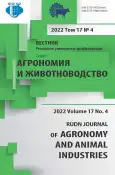Воспроизводительные способности и молочная продуктивность коров в зависимости от физиологического статуса в период лактации
- Авторы: Карликова Г.Г.1, Корнелаева М.В.1
-
Учреждения:
- Федеральный исследовательский центр животноводства - ВИЖ им. академика Л.К. Эрнста
- Выпуск: Том 17, № 4 (2022)
- Страницы: 484-498
- Раздел: Животноводство
- URL: https://journal-vniispk.ru/2312-797X/article/view/315618
- DOI: https://doi.org/10.22363/2312-797X-2022-17-4-484-498
- ID: 315618
Цитировать
Полный текст
Аннотация
В условиях интенсивного скотоводства возрастает вероятность случаев заболевания эндометритом, маститом и болезнями конечностей у коров из-за нарушения технологий содержания, кормления, доения, несоблюдения санитарных требований, в особенности в послеродовой период. Эти заболевания отрицательно сказываются на воспроизводительных и продуктивных качествах животных, нанося тем самым большой финансовый ущерб агробизнесу. Следовательно, вопрос об увеличении долголетия животных, уменьшении процента выбытия их вследствие заболеваний различной природы, а также уменьшении риска экономически значимых заболеваний в молочных стадах посредством отбора и подбора животных с высокой резистентностью к наиболее распространенным болезням высокопродуктивных стад является актуальным. Цель исследований - изучение фенотипической взаимосвязи уровня фертильности и молочной продуктивности коров черно-пестрой голштинизированной породы с разными комплексами заболеваний на примере хозяйства Московской области. Материалами исследований послужили 1234 записи с учтенными заболеваниями: эндометритом, маститом и заболеваниями конечностей, полученные из ветеринарных амбулаторных журналов 2015-2021 гг. племенной организации. Информация о 5 признаках молочной продуктивности и 3 признаках фертильности исследуемой популяции черно-пестрого голштинизированного молочного скота взята из базы данных по разведению молочного скота ИАС «Селэкс». В результате исследований у больных животных в сравнении со здоровыми отмечено достоверное (p < 0,01) увеличение: кратности осеменения в среднем за лактацию в 0,7 раза (33,5 %), сервис-периода - н а 11 дней (7,3 %), дойных дней - н а 16 (4,35 %). В среднем были выше, чем у здоровых животных: удой на 1365 кг, или на 19,4 % (p < 0,01), массовая доля жира и белка - на 0,32 и 0,33 % (p < 0,01) соответственно, выход жира и белка - на 82 и 69 кг (p < 0,01) соответственно. При сравнении показателей у животных с одним, двумя и тремя заболеваниями были получены достоверные различия между группами как с единичными заболеваниями, так и с комплексами. По фертильности показатели достоверно увеличивались с числом заболеваний от 4 до 20 % для отдельных признаков. По признакам молочной продуктивности наблюдалась тенденция снижения показателей с ростом количества заболеваний.
Ключевые слова
Об авторах
Галина Геннадьевна Карликова
Федеральный исследовательский центр животноводства - ВИЖ им. академика Л.К. Эрнста
Email: karlikovagalina@yandex.ru
ORCID iD: 0000-0002-9021-1404
доктор сельскохозяйственных наук, старший научный сотрудник отдела популяционной генетики и генетических основ разведения животных
Российская Федерация, 142132, г. Подольск, п. Дубровицы, д. 60Мария Владимировна Корнелаева
Федеральный исследовательский центр животноводства - ВИЖ им. академика Л.К. Эрнста
Автор, ответственный за переписку.
Email: marikornelaeva@yandex.ru
ORCID iD: 0000-0001-5674-6694
аспирант, младший научный сотрудник отдела популяционной генетики и генетических основ разведения животных
Российская Федерация, 142132, г. Подольск, п. Дубровицы, д. 60Список литературы
- Grachev VS, Braginets SA, Alekseeva AY. Analysis of the impact of various factors on the productivity and longevity of dairy cattle. Izvesniya Saint-Petersburg State Agrarian University. 2020;(61):73—79. (In Russ.). doi: 10.24411/2078-1318-2020-14073
- Ivanova IP, Grigoriev ME, Pilipchuk VK. Technological aspects of increasing the productive longevity of dairy herds. Molochnokhozayistvenny vestnik. 2020;(2):95—103. (In Russ.).
- Karlikov DV. Selektsiya skota na ustoichivost’ k zabolevaniyam [Selection of livestock for disease resistance]. Moscow: Rossel’khozizdat publ.; 1984. (In Russ.).
- Dallago GM, Wade KM, Cue RI, McClure JT, Lacroix R, Pellerin D, et al. Keeping dairy cows for longer: a critical literature review on dairy cow longevity in high milk-producing countries. Animals. 2021;11(3):808. doi: 10.3390/ani11030808
- Lindgren MA. Factors affecting reproductive performance and health in dairy cows in Tajikistan. Uppsala; 2017.
- Torres E, Mellado M, Leyva C, García JE, Véliz FG, Hernández-Bustamante J. Serum metabolites and body condition score associated with metritis, endometritis, ketosis, and mastitis in Holstein cows. Pesquisa Agropecuaria Brasileira. 2020;55:e01308. doi: 10.1590/S1678-3921.pab2020.v55.01308
- May K, Sames L, Scheper C, König S. Genomic loci and genetic parameters for uterine diseases in first-parity Holstein cows and associations with milk production and fertility. Journal of Dairy Science. 2022;105(1):509—524. doi: 10.3168/jds.2021-20685
- Paiano RB, Bonilla J, Pugliesi G, Moreno AM, Baruselli PS. Assessment of clinical and subclinical endometritis impacts on the reproductive performance and milk production of dairy cows in Brazilian herds. Research Square. 2022:1—12. doi: 10.21203/rs.3.rs-1585629/v1
- Rodin NV. Verifikatsiya diagnoza i terapiya korov v nachale laktatsii pri sindrome «mastit-endometrit» [Verification of diagnosis and therapy of cows with «mastitis-endometritis» syndrome at the beginning of lactation]. Saratov; 2016. (In Russ.).
- Purba FY, Suzuki N, Isobe N. Association of endometritis and ovarian follicular cyst with mastitis in dairy cows. Journal of Veterinary Medical Science. 2021;83(2):338—343. doi: 10.1292/jvms.20-0652
- Wang N, Zhou C, Basang W, Zhu Y, Wang X, Li C, Chen L, Zhou X. Mechanisms by which mastitis affects reproduction in dairy cow: a review. Reproduction in Domestic Animals. 2021;56(9):1165—1175. doi: 10.1111/rda.13953
- Smulski S, Gehrke M, Libera K, Cieslak A, Huang H, Patra AK, Szumacher-Strabel M. Effects of various mastitis treatments on the reproductive performance of cows. BMC Veterinary Research. 2020;16:99. doi: 10.1186/s12917-020-02305-7
- Ratanapob N, Thiangtum W, Rukkwamsuk T, Srisomrun S, Panneum S, Arunvipas P. The relationship between lameness and reproductive performance in dairy cows raised in small holder farms, Thailand. Songklanakarin Journal of Science and Technology. 2020;42(4):766—770.
- Skachkova OA, Brigida AV. Impact of genomic selection on health improvement of high-yielding cows. Veterinaria i kormlenie. 2021;(6):48—50. (In Russ.). doi: 10.30917/ATT-VK-1814-9588-2021-6-12
- Smirnova OV. Selection for resistance to hoof disorders in dairy cattle populations in the Nordic countries. Genetics and breeding of animals. 2017;(2):73—78. (In Russ.).
- Rostellato R, Promp J, Leclerc H, Mattalia S, Friggens NC, Boichard D, et al. Influence of production, reproduction, morphology, and health traits on true and functional longevity in French Holstein cows. Journal of Dairy Science. 2021;104(12):12664—12678. doi: 10.3168/jds.2020-19974
Дополнительные файлы










